|
Social And Fraternal Organizations
|
|
|
Recreation And The Rise Of The Social And Dance Halls Without television, snowmobiles, boating and other kinds of recreation we now take for granted how our grandparents looked to their own resources for fun. They enjoyed doing things in groups, meeting at neighbors' houses, at the district school, and later at the halls built for dances, social gatherings and other events. "Many nights," Blanche Danforth says, "in our community the neighbors would gather at someone's house and have a kitchen breakdown - a lively dance to the music of organ and fiddle - often with the people bringing box lunches." Another home entertainment was the husking bee, and in the winter there were skating and sliding parties. The district school was for years a social center for grownups as well as youngsters. Besides box socials, with boxed feasts and supper partners (supposedly unidentified) auctioned off to the men, masquerade parties were very popular. At Christmas most of the community attended the school entertainments and trees with an exchange of gifts. In May younger adults as well as children observed a rite of spring known as hanging May baskets. Grange meetings and socials were often all-day affairs. To provide for larger groups for dancing, dramatics and movies halls were erected, sometimes by individuals as business ventures and sometimes by organizations. These buildings included Union Hall at Purgatory, Stewart's Hall at the Corner, the Tacoma Dance Hall built by the Fish and Game Club on Sand Pond near the Inn, and the Whippoorwill Dance Hall at Purgatory. Early movie-goers remember that 'Gene Drinkwater played fiddle and Edna Black's mother the piano as accompaniment to the early (silent) motion pictures. source: Litchfield Yesterdays
|
|
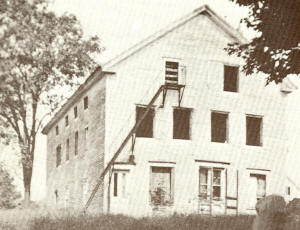 Stewart's Hall |
Sylvester Stewart came to
Litchfield Corner in later 1880's and went into business there as a
merchant in the building shown here. He put up the
multi-purpose building and stable apparently, in an effort to
attract as much business as possible from shoppers, diners, dancers
and lodgers. The first floor housed a general store; the
second an apartment, a good-sized dining room and a number of rooms
for rent; On the third floor of what may have been
Litchfield's highest and ugliest building there was a dance hall:
Stewart's Hall. Everyone who contra-danced on that upper floor remembers how the whole building used to sway with the dance figures. Finally the hall was condemned and around 1942 Alva Campbell bought it and tore it down. Howard Campbell says "It never would have fallen down; the timbers were joined with steel dogs. They tried to pull it down with a truck but couldn't, and they had to take it down piece by piece." source: Litchfield Yesterdays
|
| Union hall was built in 1886
on land donated by Daniel Bartlett with lumber given by Charles
Preble. To finance the project the Hall Association issued
shares at ten dollars each, and some persons donated work or
materials. A dramatics group was organized and proceeds of its
productions were added to the building fund. Upon completion the hall became a center of activity of the town. Church and Sunday School were held there, as were Academy senior banquets. A roller skating rink with its "Five Cent Circle" was begun. Pease's Cadet Band was organized and its concerts were well attended; horses and buggies brought listeners from miles around. When Plimpton's hoe and fork factory closed its doors many Purgatory residents moved away. Most of the organizations lost members and there was less use for the hall. Around 1910, however, several women in the village formed a ladies' circle and began putting on suppers to raise funds for the neglected hall. Dances were held on Saturday nights during the summer, and in the late twenties motion pictures were shown as well as medicine shows for a week at a time. Fondly remembered around that time was a community Thanksgiving dinner with nearly fifty persons attending. By 1937 only one original stockholder, Walter Towne, was left. Later his heirs voted to turn the hall over to the town, which finally sold it to a West Gardiner sportsmen's club to be taken down and moved away. source: Litchfield Yesterdays
|
 Union Hall At Purgatory |
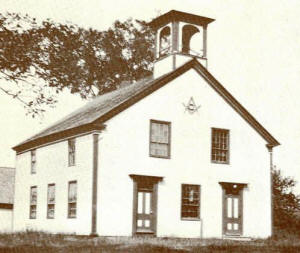 Masonic Hall - Former Liberal Institute
|
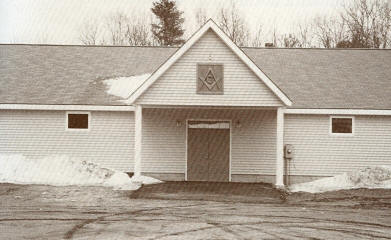 Masonic Hall, 1994
|
| By 1862 attendance
at the Liberal Institute had so shrunk that the school was forced to
close. In 1876 the building was sold to Morning Star Lodge of
Masons, which maintained it as a lodge until it was totally
destroyed by fire on March 18, 1992. H. Jean Kenny Daley
donated the lot on the corner of the Plains and Hallowell Road to the
Lodge in memory of her parents who were life-long residents of
Litchfield. Site preparation was started in 1992 and
construction of the building began in the spring of 1993. The
cornerstone laying was July 30, 1994. The building was
dedicated on May 20, 1995. Morning Star #41 Lodge Of Masons The charter of Morning Star Lodge, dated July 13, 1822, and signed by Simeon Greenlief, G.M., was issued to "All Free and Accepted Masons" of Litchfield. The first officers of the Lodge were John Neal, Esq., W.M., Capt. John Dennis, S.W., David C, Burr, J.W., John Smith, Secretary, J.W. Watson, Treasurer, and Edward Gove Tyler. They were installed in the fall of 1822. Masonry thrived in Litchfield until 1830, when as elsewhere, meetings were suspended for many years. In 1866, upon the petition of Cyrus Kendrick and many other Masons, a dispensation was granted. The first meeting after the revival was held on January 23, 1867, over the old store in the southwest corner of Litchfield Corner, and officers were elected. That year the original charter was restored. Meetings were held in different locations until 1875, when the Institute lot and buildings were purchased for $225. Membership in 1867 was 49. The Lodge celebrated its 150th anniversary in 1972 with a gala affair at Augusta Lodge. A commemorative plate was made for the occasion. Mystic Chapter #60, Order Of The Eastern Star Freemasonry's sister institution, the Eastern Star, came to Litchfield in 1900 with the organization of Mystic Chapter #60. The ladies met at the Masonic Hall at the Corner, and in the early years when travel was by horse and buggy both morning and afternoon sessions were held twice a month. At each meeting a hot noon meal was served by the "bean committee" and shared with those Academy students who had relatives in the Chapter. High spots in the Chapter history have been the 25-year celebrations. In 1925 Margaret Fish was Worthy Matron and Charles Walter, Worthy Patron. In 1950 Evelyn Seamon and Fred Seamon were Worthy Matron and Patron. For most of the past 50 years Rhona Maloon and Julia Fish have filled the office of chapter secretary. source: Litchfield Yesterdays
|
|
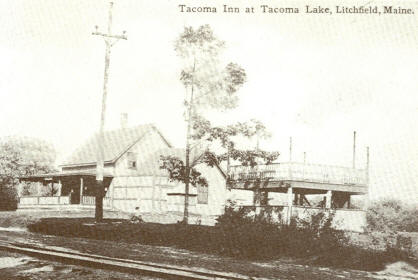 Tacoma Inn On The Androscoggin And Kennebec |
"At the junction of Sand and
Woodbury Ponds the Lewiston, Augusta and Waterville Street Railway
acquired several acres of land and erected the Tacoma Inn, where
dinners are served and lunches sold. Band concerts and other
attractions are frequently presented. Boating, fishing,
bathing and all kinds of recreations may be indulged in. This
is rapidly becoming a favorite resort for cottagers and pleasure
seekers." source: Litchfield Yesterdays
|
| One of the sights to see at
Tacoma Inn was Gorman's handsome white horses, "King" and "Queen",
jumping from a high platform into Sand Pond. source: Litchfield Yesterdays
|
 The High Diving White Horses At Tacoma Inn, 1915
|
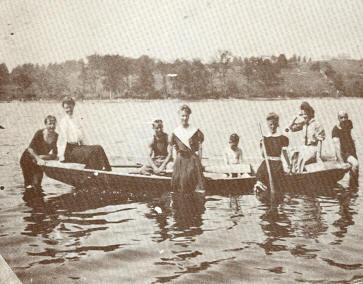 Vacationers At Upper Pleasant Pond, About 1910
|
These swimmers were summer
boarders - a species now extinct - at the Charles and Lillian Webber
Place, Grandview Farm on the Upper Pond Road. They spent their
vacations, Lydia Webber Rogers recalls, "rocking on the porch,
playing croquet, swimming, boating and fishing." And of course
they enjoyed good Maine country cooking and fresh air. They
came to the Webber farm, to the Waldron farm nearby and to other
farms and summer boarding houses including William Spaulding's on
the Pond Road. Clarence Smith, former R.F.D. carrier,
remembers the attractive dining room at Spaulding's, "with its white
tablecloths and bouquets of flowers," and the vegetable garden
across the road which supplied the table. The boarders came by
train or steamer to Richmond or Gardiner and were met by wagons from
the farms.
source: Litchfield Yesterdays
|
| The Sportsmen's
Club was built in 1976 on its present location replacing the former
building located at the Fairgrounds. The Sportsmen's Club is a
non-profit organization that sponsors a boy and girl to Boys and
Girls State; gives two scholarships; makes Christmas donations to
local churches and supports many other local charities. Funds
are raised chiefly from Bingo games held weekly at the Club House on
the Hallowell Road. source: Litchfield Yesterdays
|
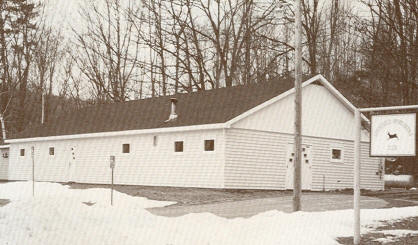 Sportsmen's Club, 1976
|